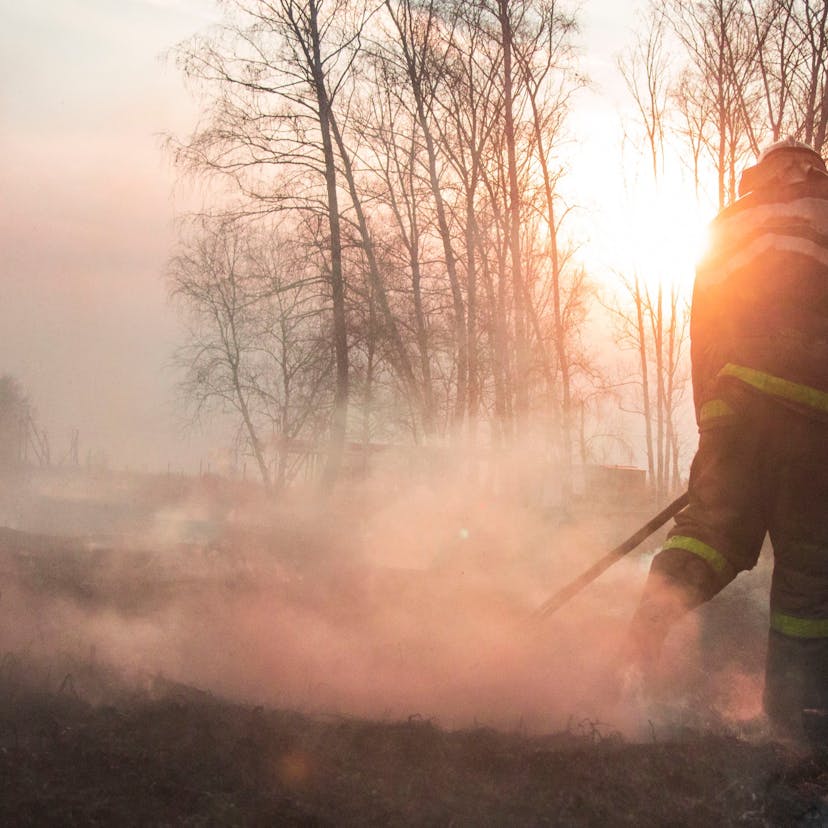Wildfire Smoke & Pregnancy
Discover how to protect against the short-term and long-term effects of wildfire smoke inhalation for pregnant moms and children.
•
Updated11/22/2024
•

Wildfire season has become the norm on the West Coast, especially in California. Like the hurricanes in Florida and the tornadoes in the Midwest, the ranging burn and subsequent smoke loom as an ever-present threat during the summer and fall.
Blazes can quickly rage out of control, making inhalation unavoidable for many. For expecting mothers, the risks of wildfire smoke inhalation during pregnancy are real. Safe smoke inhalation practices can help mitigate risks for expecting moms. So too can natural smoke inhalation detox solutions.
Read on to learn about how to naturally protect yourself from smoke inhalation during pregnancy, natural smoke inhalation detox tips for pregnancy, and the risks of smoke inhalation during pregnancy.
8 Natural Ways to Reduce Wildfire Smoke Exposure During Pregnancy

While the full long-term effects of wildfire smoke while pregnant are unknown, taking the proper precautions can help protect both moms and babies.
The following tips aren’t exclusive to expecting moms. They can benefit everyone. But expecting moms, small children (especially babies and toddlers), elderly individuals, and those who have recently suffered from COVID-19 are at particular risk when exposed to wildfire smoke. The following steps can help reduce exposure and negative side effects:
1. Avoid Going Outside When the AQI is Over 100 (as much as possible)
AQI stands for Air Quality Index. It is a numerical calculation that ranges from 0 - 500, indicating the percentage of carcinogens in the air. The higher the number, the lower the air quality. And while the naked eye can certainly see a thick cloud of smoke, poor air quality is often not visible.
In order to make sure the air is safe, it’s best to check the air quality before venturing out (this includes both where you are and where you’re headed). Local weather stations and weather apps often report the local AQI. Another fabulous resource is AirNow, which allows you to view the air quality by zip code.
Popular Health Tips
2. Keep Windows & Doors Closed
Only Mother Nature can clean up the AQI outside. Keeping windows and doors closed helps a home keep the clean air it contains so that it’s not tainted by the smoke outside. If you want to open the house up, make sure to check the AQI first.
BONUS TIP: When the AQI in your area does improve significantly (such as falling below 50), use this time to air out your house. No home is air-tight (they aren’t supposed to be). Even if you never opened the doors or windows, over time the eternal air would penetrate your home’s interior. Use good air days to fully refresh your interior air.
3. Avoid Contaminating Your Indoor Air
As much as possible, you want to maintain keep the indoor air as clean as possible. To do so, avoid lighting candles or a fire. Don’t fry or grill foods on the stove. And though this may seem strange, avoid vacuuming.
Vacuums stir up a lot of particles, which you can easily breathe in. If your floor really needs to be cleaned, options like a mop or dry sweep are good alternatives.
4. Use Your AC (if you have one)

Fire season and high heat often go hand-in-hand, which can be tough during pregnancy. Not only does running the AC help the air stay cleaner, it can help keep individuals from overheating, which is unsafe during pregnancy.
If you have an AC unit, keep it running with the fresh-air intake closed. You’ll also want to ensure it has a clean filter, to help prevent outdoor smoke from coming inside.
5. Run an Air Purifier with a HEPA Filter
In a perfect world, you’d run an air purifier in every room of the house. But that’s not practical for most households. Place air purifiers in the rooms where you spend the most time to help clean the air.
A really good alternative to air purifiers is a Corsi-Rosenthal Box, which can be affordably built using a box fan, four air filters, and plenty of duct tape. Below you’ll find a really thorough and easy-to-follow tutorial on how to build one of these at home presented by UC Davis College of Engineering.

How to Build a Corsi-Rosenthal BoxUC Davis College of Engineering via YouTube
6. If You Have to Go Outside, Go in the Early Morning
Generally speaking, early morning air is the cleanest air. This is typically attributed to reduced human-produced pollutants (such as vehicle emissions produced during the morning commute) and lower solar radiation. So if you do need to go outside, it’s best to do so early in the morning when the air is the cleanest.
7. Avoid Heavy Exertion
There’s nothing quite like exercising outdoors to offer an extra burst of endorphins. Unfortunately, you’ll want to save that heart-pounding bout in Mother Nature until the air is clean. It’s best to avoid exercising outdoors when the AQI is above 100.
Can’t avoid an outdoor activity? Limit your exertion. Walk instead of run. Limit how much weight you have to carry. Keep clothing as light and breathable as possible. The idea is to help your body be efficient with the air you’re breathing in as possible, so you reduce the need to breathe deeply and rapidly.
8. Drink LOTS of Fluids
Water (and fluids in general) offers innumerable health benefits – not the least of which is helping to flush harmful chemicals and contaminants from your body. The more water you can drink, the less likely you are to be impacted by the negative effects of any smoke inhalation you do experience.
Natural Smoke Inhalation Detox Tips for Pregnancy
The biggest danger of wildfire smoke aren’t big particles of ash floating through the air. Rather, it’s the small, imperceptible particulates that you can’t avoid breathing in. As you breathe in, these particles become lodged in your lungs, traveling into your bloodstream and making their way into all the organs in your body.
According to Jane Greenhalgh’s NPR article, ‘Is All That Wildfire Smoke Damaging My Lungs?’ it’s the, “particulate matter that's 2.5 microns or less in diameter — that are the biggest health hazard. They're so small you can't see them.”
The following are simple, natural ways you can encourage your body to shed this unwanted particulate matter — offering both short-term and long-term health benefits for you and your baby:
- Drinking LOTS of Water
- Drinking Hot Liquids
- Using a Saline Nasal Spray
- Rinsing Your Sinuses with a Neti Pot
- Breathing in Steam with Thyme
- Receiving a Vitamin-Rich IV Drip
- Loading Your Diet with Ginger
- Increasing Your Vitamin C Intake
- Upping Your Glutathione Levels
Get more information with our detailed blog post on detoxing options specifically for wildfire smoke inhalation.
3 Common Risks of Smoke Inhalation During Pregnancy

Having a baby is a big, exciting, and terrifying thing — especially when faced with things that can't be controlled, like wildfire smoke. Understanding the risks and how to mitigate them can offer both protection and peace of mind.
It’s not new news, but pregnancy places an incredible amount of stress on the female body. Women can experience a wide range of changes to their health while carrying a child, including:
1. Shortness of Breath
In a 2015 study published in the Wiley Online Library, researchers looked at whether or not shortness of breath during pregnancy could be related to a cardiac factor. During the study, researchers estimated that a staggering 60-70% of pregnant women experience shortness of breath while carrying a child.
Medical News Today attributes reports that this common pregnancy symptom is typically related to one of two causes:
- A growing uterus pushes upward on the lungs, along with hormonal increases.
- Pregnancy dyspnea, a condition that affects the respiratory system and is often harmless.
2. Increased Blood Pressure
During pregnancy, the body’s blood volume increased by 30-50%. This is a completely normal occurrence that helps nourish the growing baby. But the increased blood volume also causes pregnant women to take deeper breaths to oxygenate the extra blood.
3. Smoke Exposure Increases Preterm Birth
In February of 2023, NBC reported about a new research study that looked at the effects of wildfire smoke exposure on preterm birth risks. The study found that:
…just one day of smoke exposure slightly raised the risk of spontaneous preterm birth — defined as before the 37th week of pregnancy. But the odds of preterm birth increased by 0.3% with each additional day of smoke exposure.
Get Help
At Premier Integrative, we partner directly with you to support your health goals. Our naturopathic doctors can work directly with your OB or midwife to coordinate care that supports your current health plan — promoting a healthy birth and after-birth experience for you and your baby.






